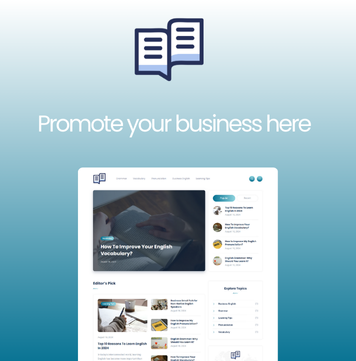
Disclaimer: This blog is for English learners who want to improve their confidence and communication skills in professional and business settings. It is designed for educational purposes and aims to support learners on their journey to mastering English for meetings and other workplace interactions.
Have you ever had a meeting in English and felt nervous about what to say or how to sound professional and native? Maybe you worried about making a mistake, forgetting a word, or not being able to express your ideas clearly. If so, please know that you are not alone. Many English learners feel exactly the same way, and that’s perfectly okay.
Learning English for meetings is all about understanding the flow of conversation and learning how to connect with others in a business environment. You can absolutely learn this skill, step by step.
In this guide, I’ll walk you through useful and natural expressions you can use before, during, and after a meeting. You’ll also find examples, gentle guidance, and encouragement to help you sound professional and relaxed. Let’s dive in together.
1. Starting the Meeting with Confidence
The beginning of a meeting is your chance to set a positive tone. Whether you’re leading the session or simply participating, your words can make others feel comfortable, and that’s a really powerful skill.
Greeting and welcoming participants
When you greet others, think of it as opening a door with a smile. You want to create a warm, friendly atmosphere. Try using phrases like:
- “Good morning, everyone. I hope you’re all doing well today.”
- “It’s lovely to see you all. Thank you for joining.”
- “Welcome, everyone. Let’s get started when you’re ready.”
These simple sentences sound kind, natural, and professional. They show respect for your colleagues and help you start strong.
If you’re hosting the meeting, you might also add something personal:
“Before we begin, I just want to thank you all for your hard work this week. I really appreciate everyone being here.”
That little touch of empathy can make the atmosphere warmer right away.
Introducing the agenda
Once everyone is settled, it’s time to outline what you’ll talk about. This helps keep the meeting organized and focused. You can say:
- “Let’s take a quick look at today’s agenda.”
- “We’ll be covering three key points today: the budget update, the new proposal, and next week’s goals.”
- “By the end of this meeting, we should have a clear decision on the next steps.”
These business English phrases for meetings help you sound confident and structured. They also show leadership, even if you’re not the one running the meeting.
2. Participating Actively and Politely
Being active means participating with purpose. It’s completely fine to take a moment to think before you speak.
Asking for clarification
Sometimes, someone might speak too quickly or use unfamiliar terms. It’s completely okay to ask for clarification. In fact, it shows that you care about understanding correctly.
Try these expressions:
- “Sorry, could you please explain that again?”
- “I just want to make sure I understood. Are you saying that…?”
- “Could you go over that last point once more, please?”
These phrases are polite, and they show professionalism. Everyone in international business settings does this, even native English speakers.
Sharing your ideas
If you want to contribute but feel shy, start small. Use simple, clear phrases to share your ideas:
- “I’d like to add something to that point.”
- “From my perspective, I think…”
- “May I share an idea that might help with this?”
These are great meeting English expressions that allow you to sound involved without feeling pressured to be perfect.
3. Handling Disagreements Gracefully
Disagreeing politely is an important skill in business English for meetings. You can express your opinion firmly without sounding rude.
Polite ways to disagree
Here are some useful ways to express disagreement respectfully:
- “I see your point, but I have a slightly different opinion.”
- “That’s an interesting idea. However, I wonder if we could look at it from another angle.”
- “I’m not completely sure I agree. Can we explore this a bit more?”
These are impressive words for meetings because they show maturity and emotional intelligence. You’re not rejecting someone’s idea but you’re simply inviting discussion.
Offering alternatives
When you disagree, try to suggest an alternative. This shows teamwork and problem-solving skills. For example:
- “What if we tried combining both ideas?”
- “Perhaps another option could be…”
- “I think we might achieve the same goal by doing it this way.”
This approach keeps the conversation positive and productive.
4. Managing Difficult Situations
Sometimes meetings can get stressful, people might interrupt, time runs out, or discussions become confusing. Here’s how to handle those moments gracefully.
When you’re interrupted
If someone interrupts you, stay calm and polite. You can say:
- “If I could just finish my point…”
- “Just to complete what I was saying…”
- “I’ll be quick — I just wanted to add one more thought.”
These phrases help you maintain control while still being respectful.
When the meeting goes off track
Meetings can easily drift off-topic. You can gently bring focus back with:
- “That’s a great point, but maybe we can return to it later.”
- “Shall we come back to the main agenda item?”
- “I think we’re moving a bit away from the topic — can we refocus on the key issue?”
These sentences show leadership and focus that are excellent qualities in business English for meetings.
5. Closing the Meeting on a Positive Note
The way you end a meeting is just as important as how you start it. It leaves a final impression and helps everyone leave feeling clear and motivated.
Summarizing the discussion
You can summarize by saying:
- “Before we finish, let’s quickly review what we’ve agreed on.”
- “To sum up, we’ll proceed with option B and follow up next week.”
- “So, our key actions are clear — great work, everyone.”
Summarizing shows clarity and professionalism, and it helps avoid confusion later.
Thanking and following up
Always end with appreciation. You might say:
- “Thank you all for your time and ideas today.”
- “I really appreciate everyone’s input. Great teamwork!”
- “I’ll send out the meeting notes by tomorrow so we’re all aligned.”
These phrases leave a warm, positive impression which is exactly what you want in a business setting.
Conclusion
Improving your English for meetings is a journey filled with small victories and steady growth. Every time you speak up, you become more confident. Every time you listen carefully, you understand a little more.
Remember, you don’t need perfect grammar to make a strong impression. What matters most is connection, kindness, and clarity. Keep practicing, stay patient with yourself, and celebrate every step forward. You’re doing amazing.
Frequently Asked Questions
How can I prepare before a meeting in English?
Review the agenda, think about what you’d like to say, and note a few key phrases or vocabulary related to the topic. Preparation brings calmness.
What should I do if I forget a word during a meeting?
Take a breath and explain it another way. For example, say, “I can’t remember the exact word, but it means…” Everyone forgets sometimes — even native speakers!
How can I sound more fluent when speaking in meetings?
Practice linking your thoughts naturally. Use short pauses and simple connectors like “so,” “actually,” or “in that case.” Fluency grows with practice, not perfection.
Is it okay to ask people to slow down?
Absolutely. You can politely say, “Could you please speak a bit more slowly?” or “Sorry, I missed that part.” It’s a common and professional request.
What’s the most important thing to remember about business English for meetings?
Be kind, be clear, and be yourself. Confidence doesn’t mean speaking perfectly — it means speaking with sincerity and respect.





Leave a Reply